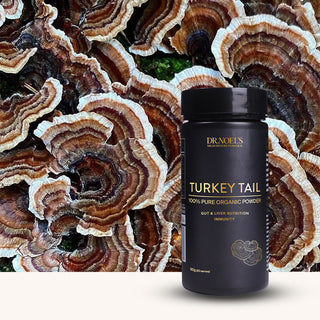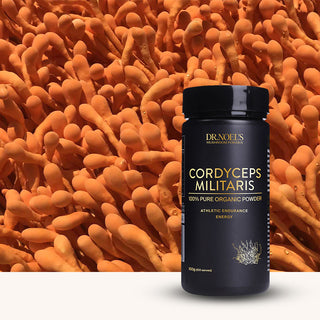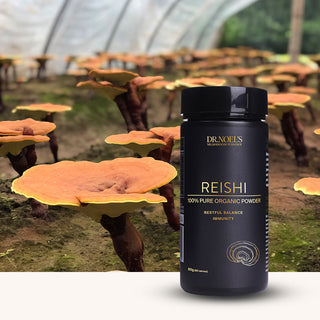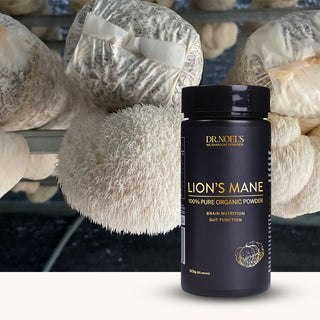Turkey Tail mushroom, or Coriolus Versicolor or Trametes Versicolor, is a popular polypore fungus that has been widely used in traditional eastern medicine. But how do these mushrooms stack up against inflammatory diseases like arthritis?
The way your arthritis is managed greatly depends on what you eat. Your quality of life while living with this condition may be greatly impacted by an anti-inflammatory diet rich in antioxidants.
Turkey tail mushrooms are packed with essential nutrients like vitamin C, which supports joint health, vitamin B9, which strengthens immunological response, and selenium. These functional fungi also have anti-inflammatory qualities that decrease pressure on the joint and swelling that causes pain. This makes Turkey tail mushrooms a popular complementary health supplement for joint wellness and healing.

What Is Turkey Tail Mushroom?
Turkey Tail mushroom, known by its scientific names such as Coriolus Versicolor or Trametes Versicolor, is a popular polypore fungus that has been used in traditional Asian medicine and North American herbalism for hundreds of years. Turkey Tail is a type of polypore mushroom that often grows on dead branches and stumps of hardwood trees. It’s a thin, rubbery, and semicircular mushroom with sometimes colorful striations on the upper surface. It is usually only 3-6 cm in width and forms longitudinal clusters and sometimes flower-like rosettes.
The mushroom is one of the most widely studied mushrooms with numerous health benefits such as
- Strengthening the immune system
- Combats inflammation
- Improving vitality
- Maintain cardiovascular and gut health
- Balances blood sugar
- Making muscles and bones stronger
- Improves liver health
- Fight against cancer cells
- Enhances strength and endurance
Today it has been deconstructed by science, vigorously studied in its chemistry, tested for biological activity, and placed through numerous clinical trials.
It’s hard not to over-emphasize how important this mushroom is in the world of medicinal mushrooms. It’s the first medicinal mushroom many of us heard about, decades before medicinal mushrooms rose in popularity. Active compounds from Turkey Tail have the stamp of approval by many healthcare agencies and are even fully insured medications in places like Japan. Statistically, Turkey Tail mushrooms have likely improved health and probably even extended the lives of thousands of individuals.
Read on to know the benefits of turkey for arthritis and the scientific research behind them.
What Makes Turkey Tail A Powerful Medicinal Mushroom?
Turkey tail’s therapeutic properties are due to at least five advantageous nutritional and active chemical types:
- Polysaccharides: Due to their stabilizing effects on the immune system, polysaccharides, such as beta-glucans, are known as immunomodulators.
- Polyphenols: When eaten, polyphenols like flavanoids, which are formed in response to environmental stresses, are linked to favorable benefits.
- Sterols: Ergosterol and fungisterol are sterols, which are hormone precursors. When exposed to sunshine, ergosterol is converted to vitamin D2.
- Vitamins and minerals: Many essential elements, including selenium, vitamin B3, and vitamin D, are present in Turkey tail mushrooms.
It would be a fairly wonderful combination if these were the only ingredients and nutrients in Turkey tail. However, polysaccharide krestin (PSK) and polysaccharide peptide (PSP) are two prominent components that give turkey tail mushroom superhero status.
How Do Turkey Tail Mushrooms Help With Arthritis?

Turkey tail mushroom is a medicinal mushroom that is beneficial for rheumatoid arthritis and osteoarthritis It is one of the best natural anti-inflammatory agents.
When ingested in the form of a double-distilled tincture, it reduces inflammation throughout the body, and when administered externally, it relieves swelling, skin eruptions, and other skin irritations. Additionally, Turkey tail modulates the immune system, which is crucial for autoimmune conditions like rheumatoid arthritis.
Turkey Tail for joint inflammation
Let’s take a look at some of the research on the benefits of Turkey tail for joint inflammation. One intriguing study examined arthritic rats with morphine tolerance (1). These animals required increasing dosages of morphine to achieve adequate pain relief. Treatment with PSP obtained from Turkey tail mushroom prevented the dependence on the painkiller. It also reduced the severity of withdrawal symptoms in rats as well as the effectiveness of
Now, how did the mushroom work? Turkey tail apparently increased beta-endorphin levels while activating a particular cannabinoid receptor. When combined, these impacts can alter how the body experiences pain. Additionally, a decrease in pro-inflammatory chemicals (which contributes to inflammation) also played a role.
Another 2020 study evaluated the effect of PSK on the expression of matrix metalloproteinase-3 (MMP-3), an enzyme that plays an important role in the development of rheumatoid arthritis (2). The study rats were divided into treatment and control groups.
The MMP3 expression and the foot diameter (indicating the degree of swelling) were measured using calipers. PSK was given to the rats, and the results showed that it could reduce the expression of MMP3. Likewise, the rats receiving the mushroom compound also showed reduced foot thickness.
In summary, this study provides scientific proof of PSK’s anti-arthritic activity in a rat with arthritis. This was probably achieved via lowering MMP3 levels and foot diameter, which is accomplished through activation of the glycan from PSK. Future treatments for arthritis patients may benefit from PSK’s beneficial effects in rheumatoid arthritis-infected rats.
Turkey Tail for oxidative stress
Oxidative stress has been linked to both rheumatoid arthritis and osteoarthritis. This degrades the membranes of the cells and the nucleic acid inside them. his leads to the impaired biological activity of the cells. Changes in the structures of protein and damage to the cellular proteins.
Turkey tail mushrooms are rich in antioxidants, which minimize cellular damage. This reduces oxidative stress.
A 2020 study evaluated the bioactive properties of Turkey tail mushrooms and analyzed their antioxidant potential (3). Results of the study supported its antioxidant properties, making it a promising source for use in oxidative stress induces arthritis.
In another 2021 study, scientists examined PSK from Turkey Tail mushroom and its immunomodulating effects on rats with rheumatoid arthritis (4). Six groups, three control, and three treatment groups were created from the 66 male Wistar white rats with arthritis. All treatment groups received daily injections of polysaccharides krestin at a dose of 50 mg/kg body weight. Inflammatory indicators were also measured using blood tests.
According to the analysis, PSK from Turkey tail mushrooms significantly reduced inflammation and severe joint damage in arthritic rats.
How To Take Turkey Tail For Arthritis?
Two grams (or 2,000 milligrams) of turkey tail mushrooms per day are the recommended dosage for improving joint health. For optimal health, this is the dose that most studies and experts advise.
A healthy maintenance dose of two grams daily supplies enough beta-glucan polysaccharides to trigger an immunological response and enhance and balance your body’s natural immune system.
FAQs About Turkey Tail For Arthritis
How Soon After Taking Turkey Tail Mushrooms Can I Expect To Observe Effects?
It may take up to three weeks for your body to start experiencing the health benefits if you’re new to taking Turkey tail mushrooms. For the first three weeks, it is advised that new users double the recommended dosage of 2 grams per day because many supplements are bio-reactive, and your body needs time to digest them.
When Should I Take Turkey Tail For Arthritis?
You can take Turkey tail mushrooms supplements any time of the day, with or without food. However, if you experience digestive upset, it is best to take them after food.
How Do I Choose a High Quality Turkey Tail Powder?
A high quality Turkey Tail powder should be made of 100% fruiting bodies and have beta-glucan amounts clearly stated on the label. Our team of fungi enthusiasts and experts have studied the market and identified the highest quality Turkey Tail producers available in different countries.
Key Takeaways
Turkey tail mushrooms contain beta-glucan polysaccharides, PSKm PSP, polyphenols, and other naturally occurring compounds with anti-inflammatory and antioxidant properties. This provides tremendous Turkey tail benefits for arthritis, easing inflammation and pain.
Try Turkey tail mushroom if you have joint issues. The right dosage of these functional mushrooms and its consistent use can support your joint health.
References
- https://pubmed.ncbi.nlm.nih.gov/30584942/
- https://www.researchgate.net/profile/Suhailah-Hayaza/publication/339140201_Effect_of_Polysaccharide_Krestin_on_MMP3_Expression_and_Foot_Diameter_in_Rheumatoid_Arthritis_in_Rat/links/5e4109d3299bf1cdb91be8a5/Effect-of-Polysaccharide-Krestin-on-MMP3-Expression-and-Foot-Diameter-in-Rheumatoid-Arthritis-in-Rat.pdf
- https://pubmed.ncbi.nlm.nih.gov/32865897/
- https://rjptonline.org/HTMLPaper.aspx?Journal=Research+Journal+of+Pharmacy+and+Technology;PID=2021-14-3-30





